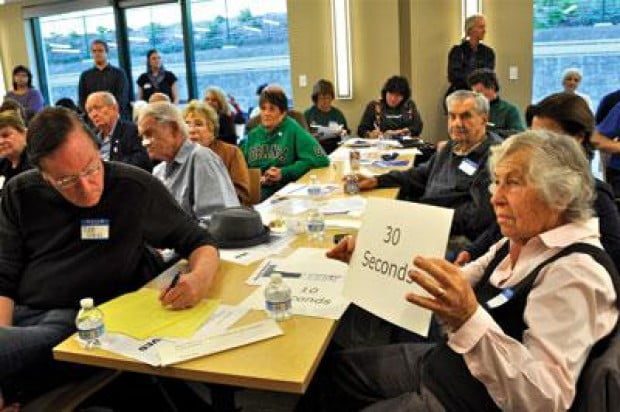
Democratic candidates for Malibu’s new state assembly district spoke Sunday at Malibu City Hall. One candidate’s camp claims stuffing of the ballot box.
By Paul Sisolak / Special to The Malibu Times
Community activist Torie Osborn proved to be the landslide favorite of members of the Malibu Democratic Club, walking away on Sunday with more than 70 percent of the group’s vote count for a seat on the California State Assembly.
But support for Osborn in an afternoon candidates forum at Malibu City Hall wasn’t without controversy. The camp of her opponent, Betsy Butler, has claimed that Osborn, who lives in Santa Monica, may have invited non-Malibu residents to sign up as members of the Malibu Dems to tilt the vote count in her favor. Club president Jean Goodman said the club’s rules on voting may be subject to change to eliminate that possibility in the future.
Osborn received 42 votes and the endorsement after promising to restore Malibu’s “spirit of independence.” Her two Democratic competitors, Butler and Richard Bloom, received five and zero votes, respectively. Butler is the current assembly woman for the 53rd District. Bloom is the mayor of Santa Monica, a member of the powerful California Coastal Commission and a family lawyer. A fourth candidate, Republican Brad Torgan, was not invited to the event.
The candidates are vying to represent a new, contentiously formed 50th Assembly District, mapped out by a special state commission following a series of lengthy redistricting meetings last year. The new district comprises most of L.A.’s Westside and stretches locally from parts of Agoura Hills, through Malibu and Pacific Palisades, up to the West Hollywood area and portions in and around Beverly Hills.
Sunday’s forum, the first for the June primary campaign, covered some of the expected issues facing California, like the state budget, the future of education and the death penalty, but also local Malibu issues such as road safety on Pacific Coast Highway, economic development and environmental preservation.
All three candidates agreed on most answers. Both Bloom and Osborn cited impending cuts to the state education system as “unacceptable.” Osborn said that education would become her first priority, if elected.
“We need to build revenues up and stop the bloodletting in education, and we do need to invest in jobs and small businesses,” she said.
They also reached similar ground on traffic safety in Malibu, especially along the treacherous PCH. Osborn said that if elected, she would continue the mission of the PCH Task Force. Butler vaguely suggested Malibu needed better representation from the county sheriff’s department. Bloom said that one solution is to work toward getting motorists to stop speeding.
“The single most important thing you can do to promote public safety on any street is to slow traffic down,” he said.
On substance abuse rehabilitation centers in Malibu, the candidates differed. Bloom and Osborn agreed that limiting the rehab centers in Malibu should remain a local issue; Butler said she would work toward getting the problem legislated at the state level.
Bloom suffered a big blow during discussion of the California State Parks plan to restore the Malibu Lagoon. The plan would use bulldozers to recontour the lagoon’s western channels to improve water quality, but it enjoys significant opposition in Malibu.
Bloom chairs the Santa Monica Bay Restoration Project which helped author the project. He elicited a loud burst of jeers after standing by the project. He stated that the support from agencies like state parks and the court system (which rejected a lawsuit by local activists to halt the restoration in October) proves that the plan works for the overall survival of the wetlands.
“I understand there are different views on this subject, but at some point we have to decide when the process has been ended and when to move forward,” Bloom said.
Bloom also differed in his views on the death penalty, saying he supports it in crimes like mass murder, where evidence is clear cut. Butler and Osborn both support an abolishment of capital punishment.
Audience members were clearly polarized in their support over the three candidates, who have each garnered support from various members of Malibu’s political spectrum. Osborn is backed by Malibu City Council member Jefferson Wagner; other councilmembers have endorsed Butler and Bloom.
Osborn, Butler and Bloom bring a diverse set of backgrounds to their candidacies. If re-elected, Butler would be a legislative newcomer to Malibu. Since she was elected to the assembly two years ago, Butler has served on several committees and subcommittees, and has helped pass the Toxin-Free Infants and Toddlers Act. Butler is also a proponent of greater awareness toward stopping abuse of the elderly.
Bloom is a Westside fixture, serving in his third term as Santa Monica Mayor, and his 13th as a city council member. He’s also a member of the California Coastal Commission and an executive director of a group helping the homeless population in L.A.
Osborn, who appears to be the most liberal of the three, said that making lasting progressive change in the newly formed district was necessary. The Republican leadership has bullied people into making a “Sophie’s choice” between equally important priorities, she said, such as between childcare or eldercare, or between firefighters and public safety. A longtime champion of LGBT rights, Osborn said that if there had been better cooperation in decades past from conservatives toward HIV and AIDS research, more of her friends who suffered from the disease would be alive today.
